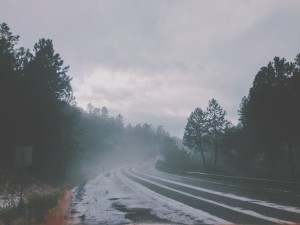“Here is something I found to be true: You don’t start processing death until you turn thirty. I live in visions, for instance, and they are cast out some fifty years, and just last year I realized my visions were cast too far, they were beyond my life span.” – Donald Miller, Through Painted Deserts
I’m not quite at thirty yet. I turn 27 in May. I’m not exactly contemplating death, but is has become less of an abstraction. A sound I didn’t think would accompany my 20s is a constant companion: My day is filled with the hiss of air. Not a cold blast blowing down from the Blue Ridge Mountains, but a purer kind of winter air, the kind run through a rubber tube to my father so he can breathe easier. The constant hiss of the air being pushed into his lungs is a reminder—a tangible metaphor of the end that is approaching us all.
Like many of my peers, I am out of college, unemployed and living at home—though my situation isn’t quite the norm. Instead of spending my days job searching, I sit at home and goof off on the internet. (Ok that’s typical of people in my situation.) At least that’s what I do until my father gets up and I roll his oxygenator into the living room and remind him to take his pills, check his blood sugar and then get him breakfast.
I don’t know many in their twenties who have to confront the mortality of a parent, at least not in the way I do. My seventy-nine year old father sits in his chair pretty much every day now and reads and watches TV. We are at opposite ends, he and I. I’m longing to be fully into the summer of my life, waiting for a career, a wife and perhaps a family; while he sits near the end of his life, his career gone and his family scattered around the country.
I worry about so much these days. It’s a suffocating feeling to be trapped in a space you feel you can’t get free from. My father feels much the same way, especially being stuck inside for the  winter months because of the cold. Yet, he doesn’t worry like I do. “God has a plan,” he says. “Maybe, I don’t know if I trust it though,” I reply. If I were in his position I would not be as calm and trusting in God. But throughout it all my dad has kept this serenity about everything, despite age and health conspiring to bring him down.
winter months because of the cold. Yet, he doesn’t worry like I do. “God has a plan,” he says. “Maybe, I don’t know if I trust it though,” I reply. If I were in his position I would not be as calm and trusting in God. But throughout it all my dad has kept this serenity about everything, despite age and health conspiring to bring him down.
It used to be I thought thirty was old. Now I look at people in their fifties and think, that’s not so bad! I worry about my next fifty years and what will happen, and it’s then I remember that if I should last that long I’ll be almost the same age as my father is now. I look at him and wonder if my life will follow a similar script. We are alike in so many ways; both of us a bit stubborn and yet willing to discuss and debate everything. And yet, I wonder if I will be as serene when my own winter comes.
It was at thirty-eight that Robert Frost wrote, “Stopping by the Woods on a Snowy Evening.” At that age, he was just 20 years before the end of life expectancy for people of that time. Looking out his window, he knew that the spectre of the end was creeping up on him. But at a time when most of us would be in a mid-life crisis, he was less concerned, talking about his promises to keep and miles to go before he slept. It was just six years before he wrote “The Road Not Taken,” which ends like this: Two roads diverged in a wood, and I – I took the one less traveled by, And that has made all the difference.
As I sit on the couch I look at my father, knowing he’s tried the road more traveled by, a life without God and supposedly without consequences. He returned to the narrow lane when he returned to his faith. I have to agree with Frost: It has made all the difference—for him and for me. Without it, this last phase of his life would be much colder and more of a struggle.
I think when you’re younger the road more travelled seems like the best option. I’ll admit I think about taking it instead of the narrow one. But when I look at how calm the winter of my father is I know it’s the wrong choice. Taking the narrow road will always be unnerving. There are more obstacles in your way, sometimes you must choose between honesty and success, your integrity or comfort. But if you’re lucky, the weathered signposts will be there—the ones put up in the winters before you, with the handwriting you know so well. That is how you know you’re on the right path.
* * * * *
 “Winter Road” was written by Michael Hadley. Most of Michael’s time has been spent migrating between Chattanooga, TN for college and Asheville, NC where his parents live. For a semester he lived between the communications department, Starbucks, and Barnes and Noble; his addiction to books and coffee is what drives him. Currently he is freelancing in Asheville, NC and Chattanooga, TN hoping to find a “real” job. His work can be found at MichaelHadley.org and his wit on twitter @MCHadley
“Winter Road” was written by Michael Hadley. Most of Michael’s time has been spent migrating between Chattanooga, TN for college and Asheville, NC where his parents live. For a semester he lived between the communications department, Starbucks, and Barnes and Noble; his addiction to books and coffee is what drives him. Currently he is freelancing in Asheville, NC and Chattanooga, TN hoping to find a “real” job. His work can be found at MichaelHadley.org and his wit on twitter @MCHadley

